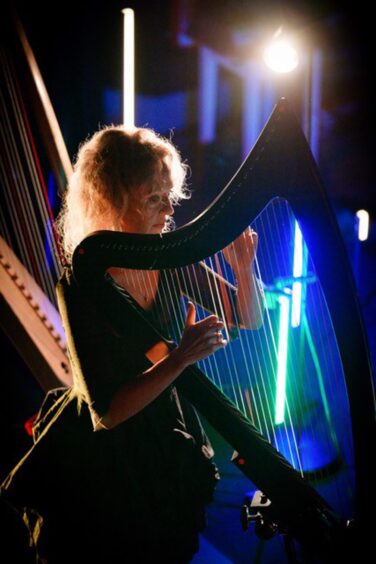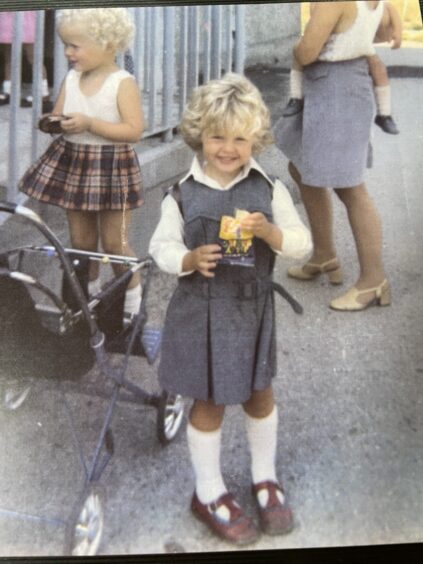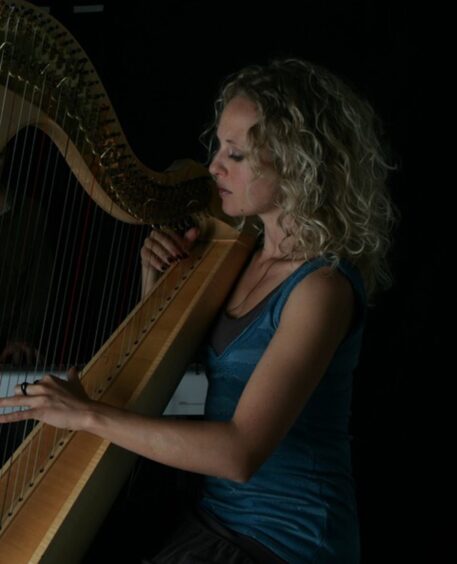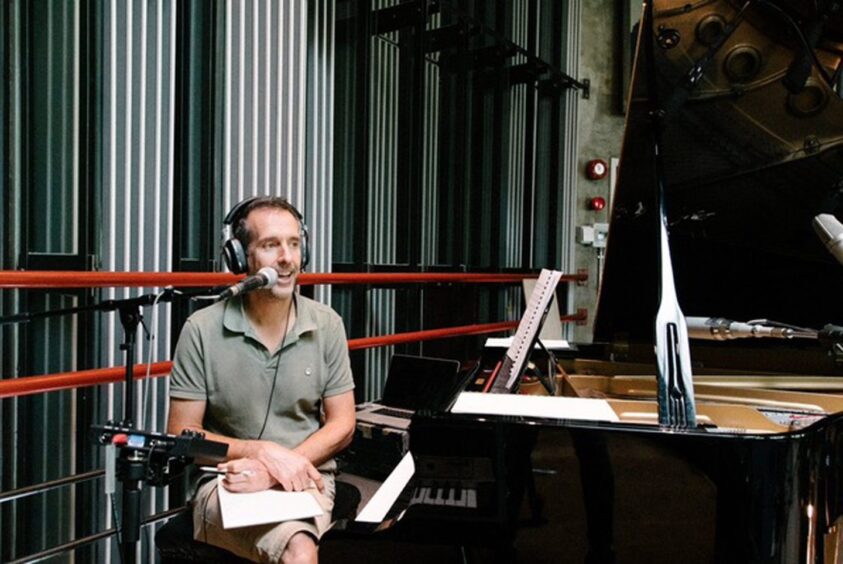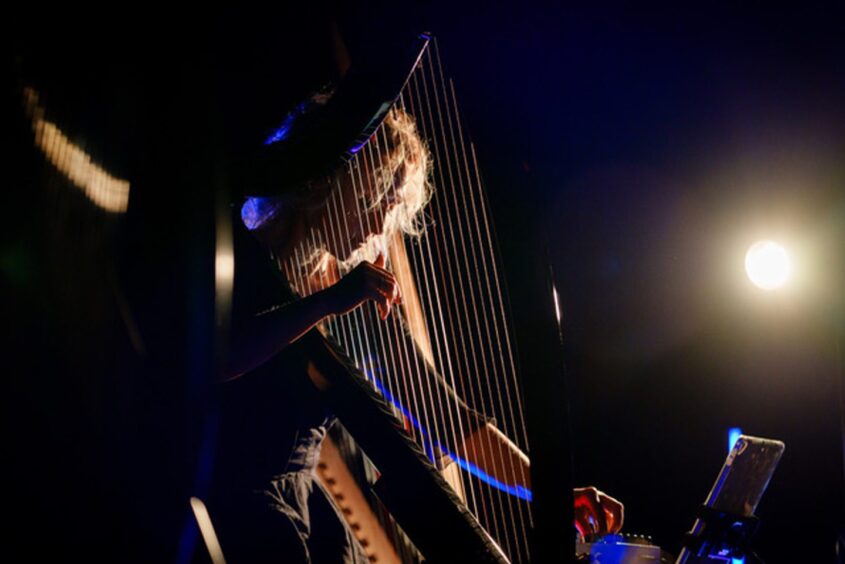World
Highland Clearances inspire musical tribute to Scotland’s migrants

Musician Ruth Wall grew up in the Ardgay area of the Highlands, an area hard hit by the Highland Clearances two hundred years ago.
Now an accomplished harpist and pianist, she lives in Cornwall with her composer husband Graham Fitkin.
But thoughts of the Highland Clearances remained ingrained in her mind and musicality from her childhood.
At primary school in Ardgay, she was taken to Croick church graveyard and taught about the 1845 Clearance of Glencalvie, when 18 families, some 90 people were cleared from their homes.
Some had camped prior to leaving in Croick church graveyard, and apparently scratched messages on the church’s east window.
They left their names, and messages like ‘Glencalvie tenants resided here, May 24, 1845’, ‘Glencalvie residents residing here’ and ‘Glencalvie people, the wicked generation.’
Some say these were scratched on later.
Ruth said: “The Croick/Glencalvie area suffered massively in the Clearances, so when I became aware in the past ten years of increasing migration in the world, I thought back to this time.”
Harpland: Musical tribute inspired by Highland Clearances
The result is a new work, Harpland, composed largely by her husband Graham with Ruth playing three very different harps on stage.
Ruth said: “It uses beautiful Scottish melodies from the time, recomposed for Harpland, but left intact, not destroyed in the process.
“One song people may know is Ale is Dear, by 18th century bagpipe maker William Gunn, who came originally from Kildonan in Sutherland and moved to Glasgow.
“It was published in his Caledonian Repository of Music Adapted for the Bagpipes in 1848.
Highland Clearances of Strath Kildonan
“Gunn was brought up in Strath Kildonan and then eventually moved south to Glasgow, around the time of the Clearances of Strath Kildonan.
“Between 1807 and 1820, many of the inhabitants of Kildonan, tenants of the Duke and Duchess of Sutherland, were cleared from their homes to make way for sheep.
“The population of the parish fell from 1440 in 1801 to 257 in 1831.”
Ruth showed musical promise from an early age
Ruth showed her talent for music at an early age, sitting at a friend’s piano and picking out a tune.
A couple of years later, Ruth started piano and harp lessons, and aged 13, she won a music scholarship to Gordonstoun School near Elgin.
“I was at Gordonstoun for five years. Although I was homesick, I had the most brilliant piano teacher, Kenneth Bews,” Ruth said.
“They had a great orchestra where I played timpani, then piano and harp. I loved being part of the concerts and productions there.”
Music college in Cardiff
From there, Ruth went to the Welsh College (now Royal) of Music and Drama, loving her time in Cardiff.
“I went out a lot to world-class opera and concerts. But at this time, I left the harp sitting, and it wasn’t until I left college that I returned to it.”
Cardiff was also the place where Ruth met her husband Graham Fitkin, about a year after she left.
She said: “Graham was playing a new piece of his in a concert, and we met there. It was life-changing.”
The Sutherland musician’s move to Cornwall
For the second time in her life, Ruth was a migrant from the Highlands, as the couple decided to live in Cornwall, where Graham had a house.
“I was a bit lonely and missed the Highlands,” Ruth admits. “I began investigating different types of harp and by the mid-90s played less piano and went completely over to the harp.”
Graham and Ruth undertook various projects together, with Graham on stage with Ruth and her harps.
Ruth said: “He designed the sound, the electronics, sometimes adding in a moog synthesizer, depending on the project.”
FitkinWall have performed around the world, from the Royal Albert Hall, BBC Proms, Aldeburgh and Glastonbury Festivals to Spiral Hall Tokyo, Aula Magna Rome and tours in Iceland, Sweden and Italy.
The Covid years
During the Covid years, all Ruth’s work engagements were wiped out.
She decided to take a part-time job in the NHS, as a healthcare assistant at the local cottage hospital.
“It was an incredible experience,” she said. “Such hard work, I take my hat off to all healthcare professionals.”
Ruth did three 12 hour shifts a week, thinking that would leave her plenty of time to do music.
But she hadn’t reckoned on how tired she would be, needing a full day to recover.
Despite the exhaustion, she started looking into old Scottish pipe and harp tunes.
The amazing Gaelic harp
She plays a reproduction of a wire-strung mediaeval Gaelic harp and “it’s amazing what it has in common with the pipers,” she said.
“The metal strings can create a drone which resonates for a long time and you can play grace notes and bagpipe like ornaments on it.
“You pluck it with your nails, and then damp it with your finger pads.
“It was a fascinating journey of discovery.”
Tales of migration
It was then that Ruth thought back to her childhood and the tales of the Highland Clearances in Sutherland.
“With migration so much in the news, the project began to grown arms and legs.
“Graham took the traditional tunes and adapted them for Ruth’s three harps, but leaving them beautiful and intact, not destroyed in the process of being recomposed.”
Migrants’ stories showcased in Harpland
Ruth interviewed migrants to Scotland from Iran, Germany, Latvia, Ukraine and Newfoundland, and in Harpland presents their stories in the breaks between the music.
She said: “They were escaping from things like war, religious persecution, economic reasons. Some came for love.
“It’s a very immersive show, with three harps on stage and amazing lighting by Peter Freeman.”
As well as the wire-strung harp, Ruth plays an electronic version of the Scottish lever-harp, and a gut-strung Renaissance bray harp, the most common harp in Renaissance Europe for around 500 years.
“It has a colossal, slightly oriental sound,” Ruth said. “It has a bray pin at the bottom of each string and buzzes almost like a sitar.”
Harpland tour coming to Inverness
FitkinWall have already toured Harpland to a number of venues in England and Wales, where Ruth says the reaction to the Scottish tunes and harp have been ‘overwhelmingly positive.”
Harpland is on at Eden Court this Sunday, May 19.
The tour continues this summer to Shetland, York, Nottingham, Wavendon and Basingstoke, and on into the autumn.
More like this:
‘He re-defined ceilidh music’: Tributes paid to the Ceilidh King Fergie MacDonald

